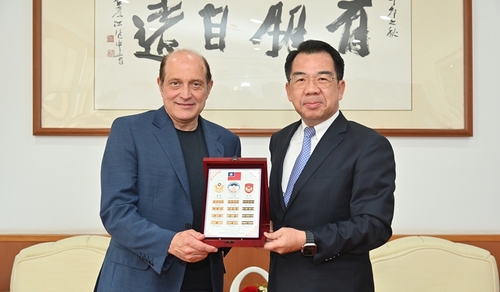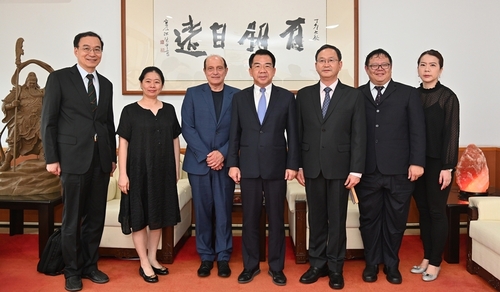Dr. David Stewart, the Associate Provost of West Virginia University, recently visited CPU for an academic exchange between the USA and Taiwan


publish date :
2023-07-10
Located in Morgantown on the East Coast of the USA, West Virginia University (WVU) is a prestigious and top-ranking public research university globally. Notably, it houses the largest crime scene comprehensive laboratory in the USA. In late May, Dr. David Stewart, the Associate Provost of WVU, visited Taiwan for academic exchange programs with several renowned educational institutions.
Dr. David Stewart visited CPU to meet with Yuan-Ming Yang, the president of CPU, for an insightful exchange on forensic science. During his visit, Dr. Stewart engaged in discussions with Prof. Sheng-Meng Wang, the Dean of the College of Police Science and Technology, Prof. Hsien-Hui Meng, Chairperson of the Department of Forensic Science, Associate Professor Christopher Yung-Fou Chen, and Director Kao Pei-Shan of the Public Relations Office. President Yang introduced Dr. Stewart to the law-enforcing education and police skill training that CPU students receive. He highlighted the Department of Forensic Science's commitment to various forensic research fields, including physics, chemistry, and biology. CPU expressed its keen interest in establishing further cooperation and fostering communication with WVU, paving the way for potential collaborations in the future.
Associate Provost David Stewart shared with CPU that WVU has established a long-term and close collaboration with the FBI. Additionally, the Department of Forensic and Investigative Science is planning to merge with the Department of Forensic Accounting in response to current crime trends. Their goal is to develop a mechanism to combat money laundering crimes in the future. During the meeting, President Yang also discussed with Associate Provost David Stewart the emerging types of crimes in Taiwan, such as Internet fraud, virtual currency, and third-party payment scams. He emphasized the importance of strengthening relevant professional courses and even considering the establishment of specialized departments to nurture students' expertise in this evolving field. The aim is to equip students with the necessary skills and knowledge to tackle these ever-changing crime trends effectively and enable them to apply what they learn in school to real-world scenarios.
In conclusion, President Yang expressed his gratitude to Associate Provost David Stewart for offering valuable insights and academic research directions from the USA. He emphasized the significance of utilizing this knowledge to ensure that CPU's police academics and practices remain up-to-date with current trends. President Yang wished him a smooth and successful trip in Taiwan as he continues his academic exchanges and collaborations.
Dr. David Stewart visited CPU to meet with Yuan-Ming Yang, the president of CPU, for an insightful exchange on forensic science. During his visit, Dr. Stewart engaged in discussions with Prof. Sheng-Meng Wang, the Dean of the College of Police Science and Technology, Prof. Hsien-Hui Meng, Chairperson of the Department of Forensic Science, Associate Professor Christopher Yung-Fou Chen, and Director Kao Pei-Shan of the Public Relations Office. President Yang introduced Dr. Stewart to the law-enforcing education and police skill training that CPU students receive. He highlighted the Department of Forensic Science's commitment to various forensic research fields, including physics, chemistry, and biology. CPU expressed its keen interest in establishing further cooperation and fostering communication with WVU, paving the way for potential collaborations in the future.
Associate Provost David Stewart shared with CPU that WVU has established a long-term and close collaboration with the FBI. Additionally, the Department of Forensic and Investigative Science is planning to merge with the Department of Forensic Accounting in response to current crime trends. Their goal is to develop a mechanism to combat money laundering crimes in the future. During the meeting, President Yang also discussed with Associate Provost David Stewart the emerging types of crimes in Taiwan, such as Internet fraud, virtual currency, and third-party payment scams. He emphasized the importance of strengthening relevant professional courses and even considering the establishment of specialized departments to nurture students' expertise in this evolving field. The aim is to equip students with the necessary skills and knowledge to tackle these ever-changing crime trends effectively and enable them to apply what they learn in school to real-world scenarios.
In conclusion, President Yang expressed his gratitude to Associate Provost David Stewart for offering valuable insights and academic research directions from the USA. He emphasized the significance of utilizing this knowledge to ensure that CPU's police academics and practices remain up-to-date with current trends. President Yang wished him a smooth and successful trip in Taiwan as he continues his academic exchanges and collaborations.
